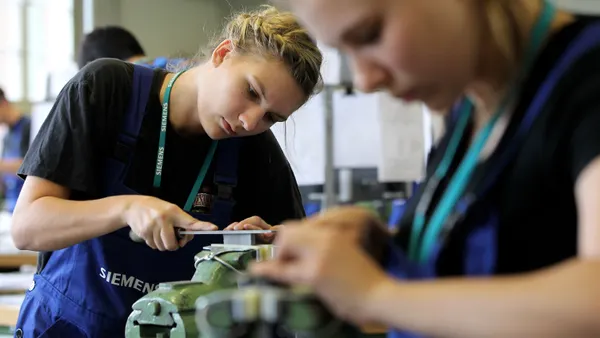Dive Brief:
- Women leaders advise upcoming female executives against playing it safe professionally and urge them to consider nontraditional paths toward success, a new study from Cigna reported. Cigna's Women in Leadership study examined the career choices and advice of 1,000 women in leadership positions.
- The study found that 8 in 10 women made a nontraditional career move, which could include accepting a less prestigious or glamorous role. Most respondents worked in more than one industry, and almost 30% changed industries at least twice. But many women pointed to the support of other women as key to their path to the top; 80% agreed that women must support and be supported by other women to succeed and 76% currently mentor at least one woman, with millennial and minority women leaders particularly likely to note that mentorship is crucial.
- An overwhelming majority of survey respondents (90%) said that continuous technological advances will require future female leaders to look for new skills, job types and career experiences.
Dive Insight:
Women make up only 18% of senior level positions, according to a recently released IBM Institute for Business Value study, even though they comprise half of the world's population. Women, especially women of color, are disappearing from the talent pool, a report from Bentley University's Gloria Cordes Larson Center for Women and Business found. What's more, the IBM study predicts that women won't achieve leadership parity with men until 2073 without employer intervention. In other words, employers must take steps to hire, develop and advance women so that they can assume executive-level roles.
Women in various studies have agreed that mentor programs and sponsorships are effective in helping them advance their careers. Thirty percent of women in a 2018 survey by the executive search firm Heidrick & Struggles said that mentoring was extremely important to their careers, compared to only 23% of men. While employees need both mentorship and sponsorship, employers must be aware of the difference between the two. Mentors provide an important venue for women to discuss their challenges and develop solutions; sponsors advocate for their protege's promotion. Betty Spence, president of the National Association for Female Executives, told HR Dive in a 2017 interview that sponsorships, rather than mentoring, are the most appropriate way for women with substantial achievement to rise to the top of their professions.
Women's inclusion in the workplace is also key to closing the leadership parity gap. Organizations can make sure women are equally recognized for their contributions and achievement and advanced accordingly. Wider recognition of the systemic blockages women must overcome to reach leadership positions is partly responsible for employers paying more attention to pay disparities and other forms of inequality in the workplace.
Correction: An earlier version of this story incorrectly described survey respondents. HR Dive regrets the error.










